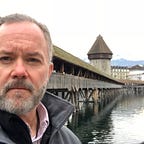De Donde Eres (Where Are You From) — On Being a Global Citizen
I was studying Spanish this morning before work. While practicing “¿De donde eres?”, or “Where are you from?”, I was reminded of the difficulty I sometimes have in answering this question, even in my native English. I grew up in a small town in North Alabama, but I have not lived there since I graduated college and started globe-trekking as a defining lifestyle. At the time of this writing, I’ve been to 51 countries and 45 states. Any one of those places (well, all but about a half dozen or so) feel just as much home to me as any other. Such is the life of a global citizen. I often think of a quote from one of my favorite founding fathers. Thomas Paine said, “The world is my country, all mankind are my brethren, and to do good is my religion.”
The lifestyle of frequent travel broadens one’s view of the world and causes a shift in how one thinks about time and place. Years ago, I discussed with someone who took issue with me saying I was going to Washington DC to see a friend at the Pentagon. “The Pentagon? The Pentagon is not in DC! It’s in Arlington, Virginia!” he exclaimed. True, the main administrative building known as “the Pentagon” is physically located in Arlington, even though the mailing address is in Washington, DC. Besides, the reason I said I was going to Washington, DC, however, really had little to do with where the Pentagon is precisely physically located. I was going to the “DC area,” what many in government circles call “The Military District of Washington,” or the “MDW.” For many who do not have deep roots in a specific area, the concept of being in the cognitive and cultural center of gravity of a given area is more important than geographic specificity. And I also planned to spend a bit of time in Washington, DC specifically and not just at the Pentagon. The point is that I was not mentally focused on a single, myopic aspect of the visit. I don’t typically think in such narrow parameters.
This often happens to me now when people ask where I live. I usually say, “New York City,” when I actually live in New Jersey. However, I have two office addresses in Manhattan, one in SoHo and one in Midtown. When I look out the windows of my apartment, which all face east, I am looking at Midtown West in Manhattan, directly across the Hudson River. Manhattan pretty much fills my windows, and the only way I actually see New Jersey is if I look down. Nothing at all against New Jersey; it’s a great state. But when I go out for dinner, about 99% of the time, it is in New York City, not in New Jersey. Owing to the proximity of bus and ferry transit into Midtown Manhattan, versus the challenge of driving anywhere, it is a matter of convenience to just head “into the city.” I’ve come to know Manhattan very well and still know almost nothing about my immediate New Jersey neighborhood aside from the space between my apartment building and the ferry terminal or the Lincoln Tunnel.
Much like the person who took issue with me saying I was going to Washington, DC when I was going to The Pentagon, many folks I know here in New Jersey take issue when I absentmindedly reply “New York City” to people who ask where I am from. Clearly, I not only don’t live in the Big Apple specifically, but I was also not raised there. Self-identification with place is just something that doesn’t resonate with me as it once did. This has been the case since I started moving all over the world at about 22 years old. For this reason, I just reflexively take the most easily recognizable nearby place and toss it out there. It’s close enough. And it avoids the necessity of explaining exactly where I am in relation to Weehawken, Hoboken, Edgewater, etc.
There is a more important aspect to this shift in mindset from colloquial to global, and it goes back to the quote from Thomas Paine. Like it or not, for good or ill, we live in an international community now. No matter what problems we are facing; anthropogenic global climate change, SARS, the next influenza pandemic, or the current health and economic devastation caused by COVID-19, we are in it together. Also, in almost every case, the solutions to these problems are likewise global in nature. All the short-sighted, “America First” rhetoric of the Trump administration aside, we are one global civilization now and have been for some time. That is not going to change, and it is only going to become more pervasive. Barring any sort of major cataclysmic event that causes us to revert back to some version of pre-industrial, localized societies, we are all citizens of the world now. While there are some downsides, I believe this interconnectedness is for the good of all of us. And it is only getting better, as long as we don’t go backward. So, hang in there — together, be safe, and to quote those two great philosophers Ted “Theodore” Logan and Bill S. Preston, “Be excellent to each other.”
